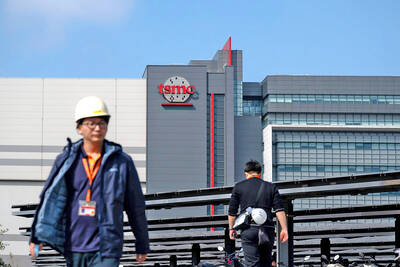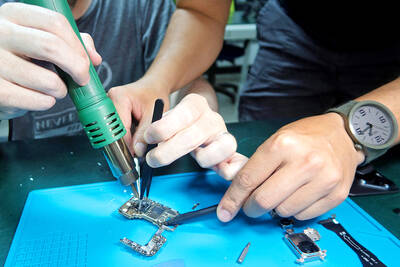Macronix International Co (旺宏電子), the world’s biggest supplier of NOR flash memory chips, yesterday said that revenue this quarter would fall further from last quarter’s NT$7.28 billion (US$225.3 million), as customers digest inventory toward the end of this year.
Amid a slump in customer demand, Macronix slashed capital expenditure for this year by about 12 percent to NT$7.9 billion from an estimate of NT$9 billion it made three months ago.
The spending would be even lower next year as the company said it would halt capacity expansion and focus on depleting its inventory.

Photo: Grace Hung, Taipei Times
Next year, factory utilization and inventory are forecast to remain at similar levels as this year, Macronix chairman Miin Wu (吳敏求) told an online investors’ conference.
The company does not expect to see a significant pickup next year, Wu added.
“If there is any, it would arrive in the second half of next year,” he said.
The company reported a net loss of NT$408 million last quarter, following a net profit of NT$71 million in the previous quarter. During the first three quarters of this year, Macronix lost NT$692 million, which translated into losses per share of NT$0.37.
Gross margin fell to 25.9 percent in the first nine months, compared with 46.9 percent in the same period last year, as the chipmaker cut 25 percent of its factory utilization to cope with sluggish demand.
The company also booked losses on inventory valuation totaling NT$2.26 billion during the first nine months of this year, and expects to book more inventory losses this quarter, as demand remains weak.
“This year is a very bearish year in terms of market demand. We are seeing many customers digesting inventory at a very slow pace, particular customers from China and Japan,” Wu said.
By product, demand for ROM chips, primarily from Japan’s Nintendo Co, would be slow this quarter as some game titles are likely to hit the market in the first quarter of next year, Wu said.
The ROM business accounted for 38 percent of Macronix’s total revenue last quarter.
Demand for NOR flash memory chips would be stable this quarter and those used in vehicles would continue to grow, he said, adding that the company has seen early signs of a rebound.
The auto segment last quarter overtook the computer segment as the biggest NOR flash memory chip revenue contributor, the company said.
Overall, NOR flash memory chips accounted for 50 percent of Macronix’s revenue last quarter, it said.

Apple Inc has been developing a homegrown chip to run artificial intelligence (AI) tools in data centers, although it is unclear if the semiconductor would ever be deployed, the Wall Street Journal reported on Monday. The effort would build on Apple’s previous efforts to make in-house chips, which run in its iPhones, Macs and other devices, according to the Journal, which cited unidentified people familiar with the matter. The server project is code-named ACDC (Apple Chips in Data Center) within the company, aiming to utilize Apple’s expertise in chip design for the company’s server infrastructure, the newspaper said. While this initiative has been

INSATIABLE: Almost all AI innovators are working with the chipmaker to address the rapidly growing AI-related demand for energy-efficient computing power, the CEO said Taiwan Semiconductor Manufacturing Co (TSMC, 台積電) yesterday reported about 60 percent annual growth in revenue for last month, benefiting from rapidly growing demand for artificial intelligence (AI) and high-performance computing applications. Revenue last month expanded to NT$236.02 billion (US$7.28 billion), compared with NT$147.9 billion in April last year, the second-highest level in company history, TSMC said in a statement. On a monthly basis, revenue surged 20.9 percent, from NT$195.21 billion in March. As AI-related applications continue to show strong growth, TSMC expects revenue to expand about 27.6 percent year-on-year during the current quarter to between US$19.6 billion and US$20.4 billion. That would

Apple Inc has closed in on an agreement with OpenAI to use the start-up’s technology on the iPhone, part of a broader push to bring artificial intelligence (AI) features to its devices, people familiar with the matter said. The two sides have been finalizing terms for a pact to use ChatGPT features in Apple’s iOS 18, the next iPhone operating system, said the people, who asked not to be identified because the situation is private. Apple also has held talks with Alphabet Inc’s Google about licensing its Gemini chatbot. Those discussions have not led to an agreement, but are ongoing. An OpenAI

Huawei Technologies Co’s (華為) latest high-end smartphone features more Chinese suppliers, including a new flash memory chip and an improved chip processor, a teardown analysis showed, pointing to the progress China is making toward technology self-sufficiency. The inside of Huawei’s Pura 70 Pro was examined by online tech repair company iFixit and consultancy TechSearch International, finding components made by Chinese suppliers. The firms also found that the Pura 70 phones run on an advanced processing chipset made by Chinese chip foundry Semiconductor Manufacturing International Corp (SMIC, 中芯) called the Kirin 9010, which is likely a slightly improved version of the advanced chip